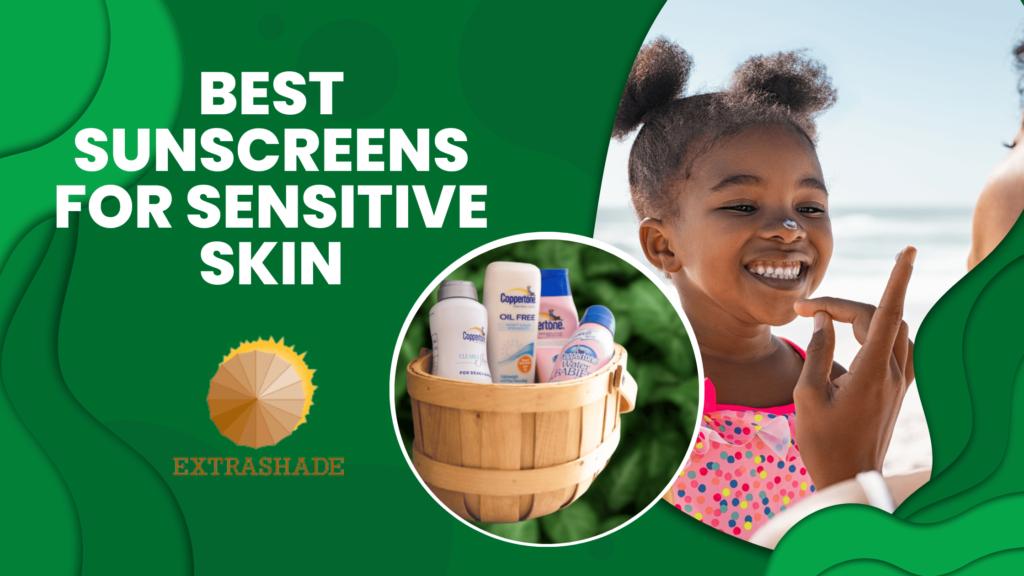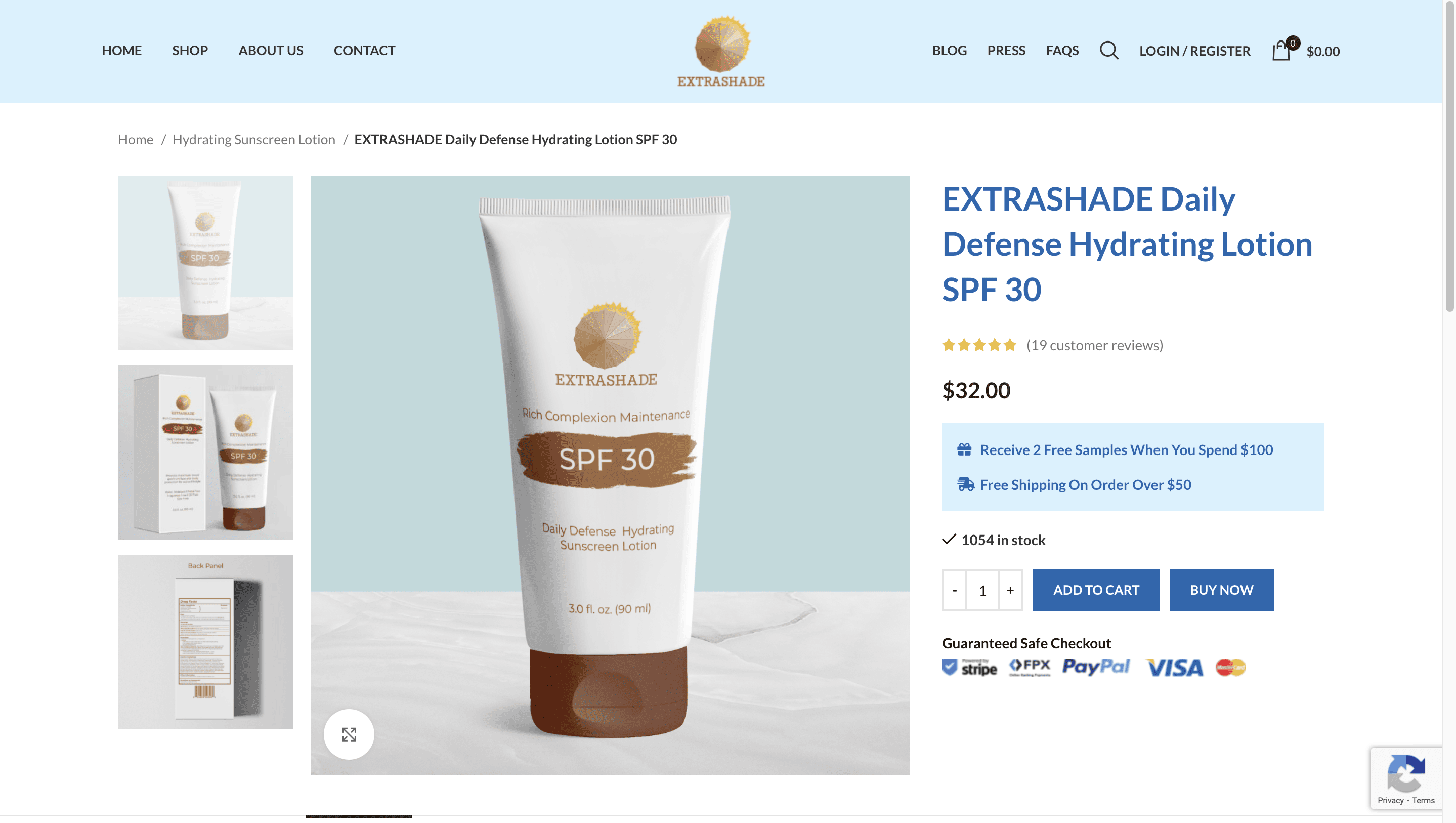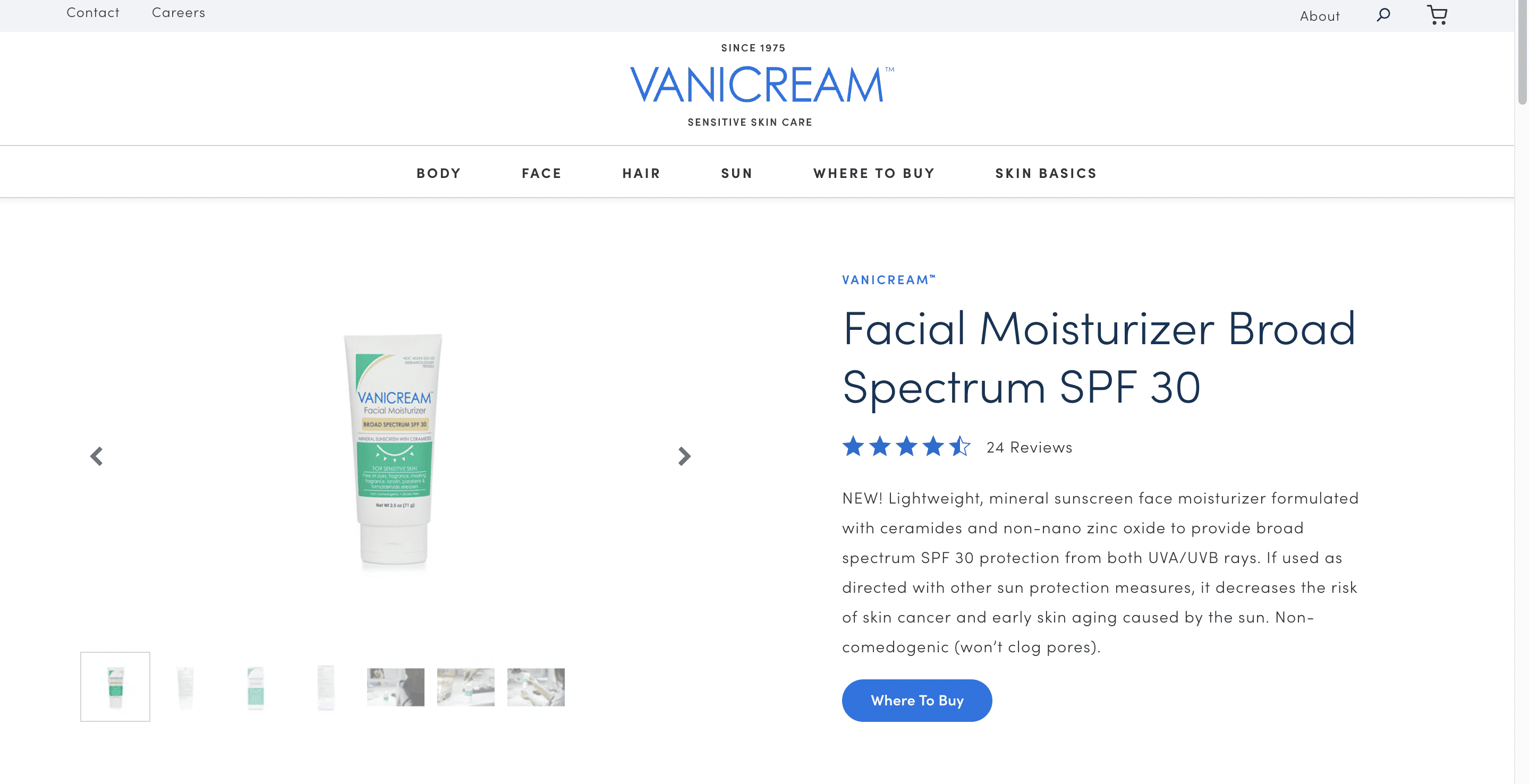The sun is out, the birds are singing, and the flowers are blooming. It’s a beautiful day to be outside, but for those with sensitive skin, the sun can be a major source of irritation.
But don’t despair! There are plenty of great sunscreens available that are specifically designed for sensitive skin. These sunscreens are non-irritating, non-comedogenic, and water-resistant, so you can enjoy the outdoors without fear of breaking out or getting a rash.
So what are the best sunscreens for sensitive skin?
To know the answer, let’s dig deeper.
Top 3 Best Sunscreens for Sensitive Skin- Our Favorite Collections
After a deep and extensive research, we have handpicked a list of the best 3 sunscreens for sensitive skin that will help you make your day shiny and glory. Here we go.
1. EXTRASHADE Daily Defense Hydrating Lotion SPF 30
Experience the rejuvenating power of EXTRASHADE Daily Defense Hydrating Lotion SPF30. This premium lotion not only nourishes dry and sensitive skin but also provides advanced protection against both UVA and UVB Rays. Say goodbye to messy white chalky residues and embrace a flawless, radiant finish. Here are some specialities of this sunscreen lotion.
- It is a broad-spectrum sunscreen that protects against UVA and UVB rays.
- It has an SPF of 30, which is considered to be a high level of protection.
- It is oil-free and non-comedogenic, which means that it is less likely to clog pores or cause breakouts.
- It is fragrance-free, which makes it a good choice for people with sensitive skin.
- It contains hyaluronic acid, which helps to hydrate the skin.
- EXTRASHADE Daily Defense Hydrating Lotion SPF 30 for sensitive skin
Here are some of the pros and cons of EXTRASHADE Daily Defense Hydrating Lotion SPF 30 for sensitive skin:
Pros:
- It is a good choice for people with sensitive skin.
- It is oil-free and non-comedogenic.
- It contains hyaluronic acid, which helps to hydrate the skin.
- It has an SPF of 30, which is considered to be a high level of protection.
Cons:
- It can be a bit pricey.
Overall, EXTRASHADE Daily Defense Hydrating Lotion SPF 30 for sensitive skin is a good option for people who are looking for a high-quality sunscreen that is gentle on the skin.
2. BLUE LIZARD Sensitive Mineral Sunscreen
Introducing the cutting-edge sensitive mineral sunscreen from Blue Lizard, delivering an unmatched SPF 50+ protection to safeguard your skin. Embrace your favorite pursuits, be it swimming, running, or any other cherished activity, knowing this sunscreen grants you extended security for up to 80 minutes even amidst sweat and water. Revel in the freedom of enjoying what you love with confidence, shielded by the best in UV protection. Here are some specialities of this sunscreen.
- It is a broad-spectrum sunscreen with SPF 50+, which means it protects the skin from both UVA and UVB rays.
- Blue Lizard Sensitive Mineral Sunscreen
- It is made with zinc oxide and titanium dioxide, which are mineral-based sunscreen ingredients that are less likely to irritate sensitive skin.
- It is also non-comedogenic, which means it will not clog pores.
- It is fragrance-free and oil-free.
- It is water-resistant for up to 80 minutes.
- It is available in a variety of sizes, including a 5-ounce bottle, a 8.75-ounce bottle, and a 0.5-ounce stick.
Here are some pros and cons of Blue Lizard Sensitive Mineral Sunscreen:
Pros:
- Broad-spectrum SPF 50+
- Made with mineral-based ingredients
- Non-comedogenic
- Fragrance-free and oil-free
- Water-resistant
Cons:
- Can be a bit thick and difficult to apply
- Can leave a white cast on the skin
- Pricey
Overall, Blue Lizard Sensitive Mineral Sunscreen is the perfect deal for people with sensitive skin who are looking for a broad-spectrum, mineral-based sunscreen with an SPF of 50+.
3. Vanicream Facial Moisturizer SPF 30 Mineral Sunscreen
Discover Vanicream Facial Moisturizer Broad Spectrum SPF 30 – a lightweight, mineral sunscreen enriched with ceramides and non-nano zinc oxide. Safeguard your skin from UVA/UVB rays, reducing the risk of skin cancer and premature aging caused by the sun. Prioritize your skin’s health today. Below are the some specialties of this sunscreen.
- It is a lightweight, non-comedogenic, and fragrance-free sunscreen that is formulated with non-nano zinc oxide to provide broad-spectrum SPF 30 protection from the sun’s UVA and UVB rays.
- Vanicream Facial Moisturizer SPF 30 Mineral Sunscreen
- It is also free of dyes, lanolin, parabens, and formaldehyde releasers.
- It is suitable for all skin types, including sensitive skin.
- It is also oil-free and water-resistant, making it a good choice for everyday use.
Here are some of the pros and cons of Vanicream Facial Moisturizer SPF 30 Mineral Sunscreen:
Pros:
- Lightweight and non-greasy formula
- Broad-spectrum SPF 30 protection
- Hypoallergenic and non-comedogenic
- Free of dyes, lanolin, parabens, and formaldehyde releasers
- Suitable for all skin types, including sensitive skin
Cons:
- Can be a bit drying for some people
- May leave a white cast on the skin
- Can be slightly more expensive than other sunscreens
In general, Vanicream Facial Moisturizer SPF 30 Mineral Sunscreen proves to be an excellent choice for individuals with sensitive skin seeking a gentle, non-greasy sunscreen that offers broad-spectrum protection.
How to Choose The Best Sunscreen for Sensitive Skin?
Choosing the best sunscreen for sensitive skin requires careful consideration of ingredients, formulation, and specific needs. Here are some tips to help you find the right sunscreen:
1. Look for Physical Sunscreens
Physical sunscreens contain mineral ingredients like zinc oxide and titanium dioxide, which sit on the skin’s surface and block UV rays. They are less likely to cause irritation compared to chemical sunscreens, which can absorb UV rays and may be harsher on sensitive skin.
2. Avoid Harmful Chemicals
Stay away from sunscreens containing potential irritants such as oxybenzone, avobenzone, octocrylene, and para-aminobenzoic acid (PABA). Instead, opt for sunscreens with simple and natural ingredient lists.
3. Fragrance-Free and Hypoallergenic
Choose sunscreens that are labeled as “fragrance-free” and “hypoallergenic.” Fragrances can cause skin irritation, and hypoallergenic products are less likely to cause allergic reactions.
4. Broad-Spectrum Protection
Ensure that the sunscreen offers broad-spectrum protection, which means it shields your skin from both UVA and UVB rays. UVA rays can prematurely age the skin, while UVB rays cause sunburn.
5. SPF Rating
Select a sunscreen with a Sun Protection Factor (SPF) of at least 30 or higher. SPF 30 blocks about 97% of UVB rays, and higher SPFs provide slightly more protection. However, keep in mind that no sunscreen can offer 100% protection, so reapplying regularly is crucial.
6. Water-Resistant
If you plan to be in the water or sweat a lot, consider a water-resistant sunscreen to ensure better coverage and protection during these activities.
7. Patch Test
Before applying sunscreen to your entire face or body, do a patch test on a small area of your skin to check for any adverse reactions.
8. Consult a Dermatologist
If you have severe skin sensitivity or allergies, it’s a good idea to consult a dermatologist. They can recommend specific sunscreens tailored to your skin’s needs.
9. Non-Comedogenic
If you have sensitive skin prone to acne or breakouts, look for a sunscreen labeled as “non-comedogenic,” meaning it won’t clog pores.
10. Consider Your Skin Type
Sensitive skin can come in various types—dry, oily, combination. Choose a sunscreen that complements your skin type and doesn’t exacerbate any pre-existing skin concerns.
Frequently Asked Questions (FAQs)
Q1: What is sensitive skin, and why do I need a special sunscreen for it?
A: Sensitive skin is more prone to irritation and reacts easily to various environmental factors, including sun exposure. Sunscreens designed for sensitive skin are formulated with gentle ingredients, free from common irritants like fragrances and harsh chemicals. They offer broad-spectrum protection without causing adverse reactions on sensitive skin.
Q2: What is the difference between physical and chemical sunscreens for sensitive skin?
A: Physical sunscreens contain mineral ingredients like zinc oxide and titanium dioxide that sit on top of the skin and create a physical barrier against UV rays. They are less likely to cause irritation, making them a good choice for sensitive skin. Chemical sunscreens, on the other hand, work by absorbing UV rays and converting them into heat. Some chemical filters may cause irritation in sensitive skin, so it’s essential to choose carefully.
Q3: Are there any specific ingredients I should avoid in sunscreens for sensitive skin?
A: Yes, individuals with sensitive skin should avoid sunscreens containing fragrances, oxybenzone, avobenzone, octocrylene, and para-aminobenzoic acid (PABA). These ingredients can be potential irritants for sensitive skin and may lead to reactions like redness, itching, or rashes.
Q4: Can I use a sunscreen labeled “hypoallergenic” for sensitive skin?
A: While the term “hypoallergenic” suggests that a product is less likely to cause an allergic reaction, it’s essential to check the ingredient list to ensure there are no potential irritants. Some hypoallergenic sunscreens may still contain ingredients that could be problematic for sensitive skin, so always read the label carefully.
Q5: Can I use a water-resistant sunscreen for sensitive skin?
A: Yes, water-resistant sunscreens can be a good option for sensitive skin, especially if you plan to swim or engage in water activities. However, ensure that the sunscreen is labeled as water-resistant for at least 40-80 minutes and still suitable for sensitive skin.
Q6: Are natural or mineral sunscreens better for sensitive skin?
A: Natural or mineral sunscreens, which typically contain zinc oxide or titanium dioxide as active ingredients, are often better tolerated by sensitive skin compared to chemical sunscreens. They provide effective protection without the use of potentially irritating chemical filters.
Q7: Should I avoid sunscreens with preservatives for sensitive skin?
A: Preservatives are necessary to maintain the stability and shelf life of sunscreen products. While some individuals with extremely sensitive skin may prefer preservative-free formulations, others may not have any issues with well-formulated sunscreens containing mild preservatives.
Last Call
In conclusion, finding the right sunscreen for sensitive skin can be a challenge, but it is not impossible. By considering factors such as SPF level, ingredient list, and user reviews, individuals with sensitive skin can make an informed decision about which sunscreen to choose.
Additionally, opting for mineral-based sunscreens that contain ingredients like zinc oxide or titanium dioxide can provide added protection without causing irritation. It is important to remember that everyone’s skin is different, so what works for one person may not work for another.
Therefore, it may take some trial and error to find the perfect sunscreen for sensitive skin. Remember to always consult with a dermatologist if you have any concerns or questions about which products are best suited for your individual needs.






